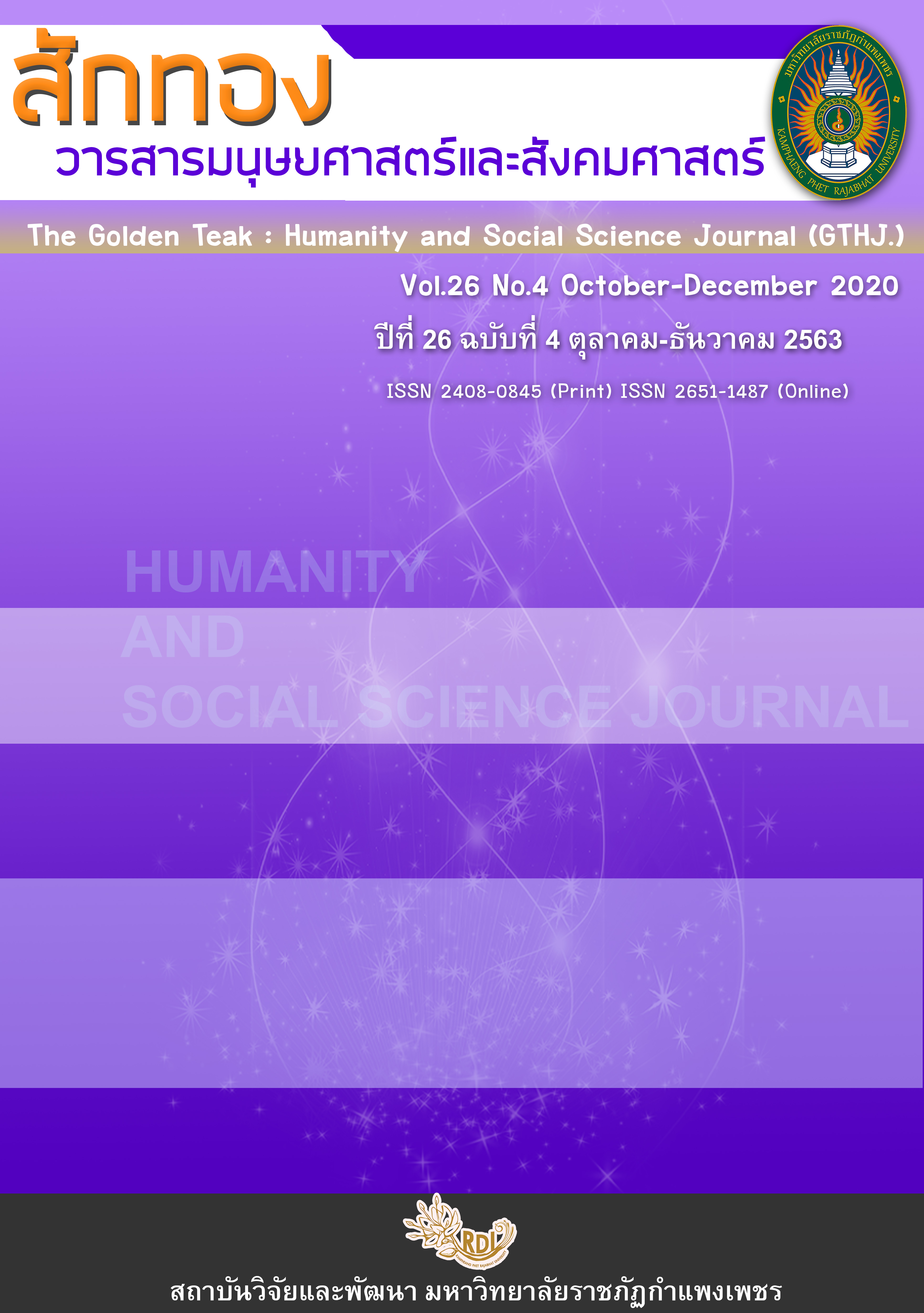Model of Development Family Institutionintegrative Buddhismbased
Main Article Content
Abstract
The purposes of this study were: 1) to study Problems and Solutions Family Foundation Thailand 2) to study the process developed by Buddhist families 3) to propose a model for the development of Thai Buddhist family institutions. The quantitative analysis’s results of data found that the model of development family institution integrative Buddhism based on Buddhist Principles, it showed that in the overall, was at high level on average at 4.26 and the standard deviation at 0.15. Comparative study of model of development family institution integrative Buddhism based on Buddhist Principles in the overall was not different with statistically significant at 0.05. and the qualitative analysis’s results of data found that the lifestyle, culture and tradition and local social activities from past to present were an influence in the model of development family institution. The guideline of development of family institutions according to the 5 precepts showed that Driving action on principle of 5 precepts is a system of development of family institutions and creating peace for the society with the four reasons for lastingness of a wealthy family is the doctrine of Buddhism for those who hope for success in the family, by doing oneself to complete together with the virtues for lay people, the virtues that protect the world, the basis for success and the practice for the layman. There are 7 models of the development of family institutions based on Buddhist principles, including 1) the models of the development of family institutions by learning; 2) the models of the development of family institutions by hygiene principles; 3) the models of the development of family institutions with economic system; 4) the models of the development of family institutions with risk reduction; 5) the models of the development of family institutions with support and problem solving; 6) the models of the development of family institutions with the prevention and elimination of violence in the family and 7) the models of the development of family institutions with creating a management the strength in family.
Article Details
บทความที่ได้รับการตีพิมพ์เป็นลิขสิทธิ์ของวารสาร สักทอง : วารสารมนุษยศาสตร์และสังคมศาสตร์ สถาบันวิจัยและพัฒนา มหาวิทยาลับราชภัฏกำแพงเพชร
ข้อคิดเห็นใดๆ ที่ปรากฎในวารสารเป็นวรรณกรรมของผู้เขียนโดยเฉพาะ ซึ่งมหาวิทยาลัยราชภัฏกำแพงเพชรและบรรณาธิการไม่จำเป็นต้องเห็นด้วย
References
Mahachulalongkornrajavidyalaya University.
Gage, N.L. & David C. Berliner. (1979). Educationnal Psychology. (2 nd ed.). Chicago : Rand
McNally College Publishing.
Hurlock, E.B. (1964). Child Development. (2 nd ed.). New York : McGraw-Hill.
Kevin Browne & Martin Herbert. (1997). Preventing Family Violence. England : John Wiley &
Sons Ltd.
Mahachulalongkornrajavidyalaya University. (1996). Thai Tripitaka Version of Maha
Chulalongkorn Ratchawitthayalai. Bangkok : Mahachulalongkornrajavidyalaya
University Printing School.
Mahamakut Printing Factory. (2005). Tripitaka, Thai language commentary, 91 books.
Nakhon Pathom: Mahamakutrajavid College.
Thammabovorn, N. (1998). The Role of the Family and Education, Research Report
for Draft National Education Act. Bangkok : Office of the National Education
Commission.
Chalemann, S., et al. (1991). desirable Thai family style In urban society in Thailand.
Bangkok : Social Welfare Council of Thailand Nationals.
Phramahasomboon Wutthikaro (Panna). (2003). Buddhism for Society: A Case Study of the
Interpretation of the 5 Precepts of the Buddhist Society for International Society.
A Thematic Paper Submitted in Partial Fulfillment of Qualifying Examination Related to the Subject of Selected Topics In The Development of Buddhism Degree of Doctor of Philosophy (Buddhist Studies). Graduate School : Mahachulalongkornrajavidyalaya University.
Phraviman Gambhĩrapañño (trikamol). (2012). An analytical study of the five precepts in
terms of the base of peace A Dissertation Submitted in Partial Fulfillment of The
Requirement for The Degree of Doctor of Philosophy.Buddhist Studies). Graduate
School : Mahachulalongkornrajavidyalaya University.
Masrungson, P. (2012). Family Violence Management in Integrative Buddhist Perspective.
A Thesis Submitted in Partial Fulfillment of Doctor of Philosophy. Graduate School:
Mahachulalongkornrajavidyalaya University.
Bamrungpakdi, S. (2006). Study and analyze 5 precepts in the Tripitaka. A Thematic Paper
Submitted in Partial Fulfillment of Qualifying Examination Related to the Subject of
Selected Topics in The Development of Buddhism Degree of Doctor of Philosophy
(Buddhist Studies). Graduate School : Mahachulalongkornrajavidyalaya University.
Phadungthiti, T. (2007, December). Legal dimension for solving domestic violence problems.
Journal of New Law (Law Digest), 5(90), 34-35.
Her granddaughter HRH Princess Patchara Kitiyapa. (2017). Suggesting Solutions to Domestic
Violence. [Online]. Available : http://www.naewna.com. [2017, July 4].
Khomphudchar, J. & Teerachanchai, C. (2015, January-June). Tors Associated with Complete
Treatment Among Addictive Substance Users in Nakhon Ratchasima Province.
The Golden Teak : Science and Technology Journal (GTSJ.), 2(1), 21-34.


